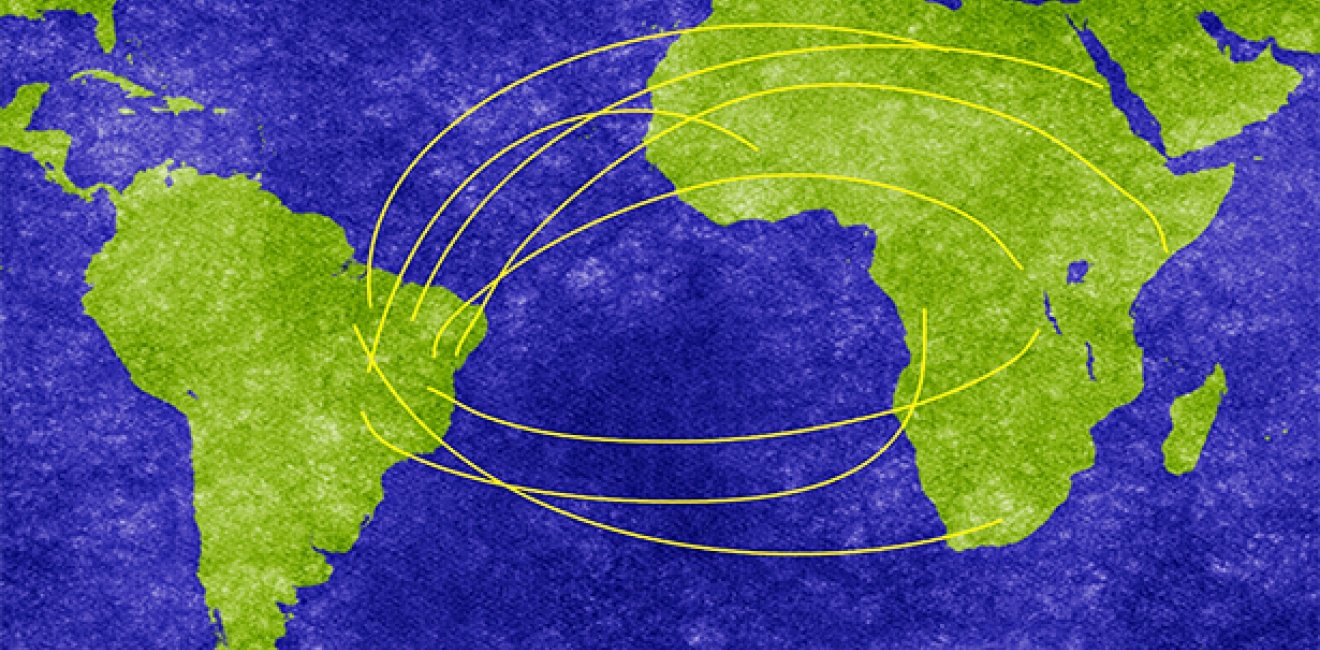
A blog of the Africa Program
Portuguese Translation of the Week
[caption id="attachment_2282" align="aligncenter" width="615"] Map attributed to Nicolas Raymond, Free Grunge Textures/Creative Commons[/caption]
Brazil: Eager to Explore New Frontiers in Africa
"The government and some large Brazilian companies are betting on the opening of new frontiers in the African market.
In recent years, Brazil has increased its economic presence both in Lusophone Africa – mainly Angola and Mozambique – as in South Africa (considered to be one of the more "mature markets" in the region along with North African countries.)"
"O governo e algumas grandes empresas brasileiras estão apostando alto na abertura de novas fronteiras no mercado africano.
Nos últimos anos, o Brasil ampliou sua presença econômica tanto na África lusófona - principalmente Angola e Moçambique - quanto na África do Sul (considerada um dos "mercados maduros" da região, junto com países do norte africano)."
This article has been translated from Portuguese. Click here to read the original version on BBC BRASIL.
Now, explained Ambassador Paulo Cordeiro, secretary-general of the Ministry of Foreign Affairs for Africa and the Middle East, one of the greatest challenges for Brazilian diplomacy is to create the right conditions so that a growing number of companies explore new investment opportunities in emerging African markets, such as Ethiopia, Nigeria, Sudan, Kenya, Guinea, Tanzania, Senegal and Ghana.
"These efforts are a big part of my work. We are committed to creating the right environment for this expansion to take place, and to convince Brazilian society that the African continent has many interesting opportunities to offer- and not only in Portuguese speaking countries," said Cordeiro.
Official initiatives range from programs for military and technical cooperation to projects for expanding the financing of investments in the continent as well as efforts for political rapprochement.
These initiatives work alongside some large Brazilian companies that have been actively seeking out business opportunities in countries that until recently were synonymous with conflict and extreme poverty, interested primarily in opportunities in the infrastructure and natural resources sectors.
According to Cordeiro, the decision announced by President Dilma Rousseff to forgive $900 million dollars of African debt took place amidst these expansion plans.
Financing
In total, 12 countries will benefit from President Rousseff's decision: Congo, Tanzania, Zambia, Senegal, Ivory Coast, Democratic Republic of Congo, Gabon, Guinea, Mauritania, Sudan, Sao Tome and Principe and Guinea-Bissau –of which only the last two classify as Lusophone nations.
Until recently, Brazilian state-owned banks could not finance investments and trade flows to these countries because of their unsettled debts with Brazil.
This measure will allow the Brazilian Development Bank (BNDES) and Banco do Brasil to finance Brazilian exports as well as investments and infrastructure projects carried out by Brazilian companies (today, almost all BNDES loans for projects in Africa go to Mozambique and Angola.)
"The demand for investment and cooperation called for by African countries is immense," said Cordeiro. "Tanzania wants Brazilian companies to help in the hydroelectric sector, for example, and Gabon seeks investments in oil. We also have many Brazilian companies interested in participating in this market – but we are still lacking the means to finance such projects."
According to the Ambassador, in order to solve this problem, proposals were made to BNDES to create a board responsible solely for loans to Africa and Latin America.
"We need to think of appropriate financial instruments for these projects in Africa and understand what their guarantees could be," stated Cordeiro.
Cooperation
Cordeiro points out that in the field of technical cooperation, the Brazilian Agricultural Research Corporation (Embrapa) already has projects in several African Countries – among them Senegal, Mali and Ghana. In addition, in terms of military exchange, there has been significant Brazilian participation in the training of Namibia's Navy.
In the past three months, Dilma made three trips to Africa. Besides her trip to Ethiopia where she participated in the celebration of the African Union's anniversary, she also went to Guinea Bissau in February to attend the third South America-Africa Summit and to Nigeria to meet with President Goodluck Jonathan.
In March, she attended the 5th BRICs summit in South Africa, taking the opportunity to also meet with leaders of other African countries.
Moreover, according to the Foreign Ministry (Itamaraty,) in recent years efforts have been made to expand the infrastructure of various Brazilian embassies in Africa, which more than doubled over the last decade, allowing Brazil to rank fourth, along with Russia, in terms of countries with the largest representation in the Continent (behind the United States, China and France.)

Africa Program
The Africa Program works to address the most critical issues facing Africa and US-Africa relations, build mutually beneficial US-Africa relations, and enhance knowledge and understanding about Africa in the United States. The Program achieves its mission through in-depth research and analyses, public discussion, working groups, and briefings that bring together policymakers, practitioners, and subject matter experts to analyze and offer practical options for tackling key challenges in Africa and in US-Africa relations. Read more

Explore More in Africa Up Close
Browse Africa Up Close
The Innovative Landscape of African Sovereign Wealth Funds



